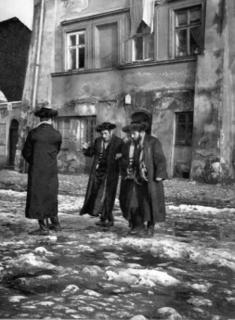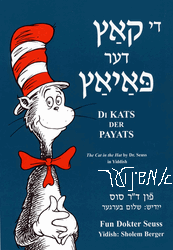Friday, September 09, 2005
Thursday, September 08, 2005
Shmuel who?
Feldhiem has just released a comic style children's book on Rabbanu Shmuel ha-Nagid. And I'm thrilled ,you see several years ago after Rabbi Beryl Wein had left Sharrie Torah in less then capable hands, he returned as a quest speaker and related to the yeshiva the great story of RSH.
Before the year 1000 , records of Jewish poetry are primarily religious. After that date, secular Jewish poetry began to flourish in Spain. This was the time of the Arab conquest of North Africa and Spain, and the Jews spoke Arabic , while continuing to use Hebrew in their services. Arabic was used in Jewish philosophy. As translators, Jews brought the philosophies of the classical world that had been preserved in Arab cultural centers back into Europe. As poets, they brought the techniques of Arab poetry into the language of Hebrew.
Rabbanu Shmuel ha-Nagid (Shmuel ha-Levi ben Joseph ibn Nagrela, 993-1056 CE) was born in Cordova. He fled to Malaga, in the Berber province of Granada when the Berbers attacked in 1013 .He advanced from a tax collector, to secretary, to assistant vizier, and was appointed vizier in 1027.His responsibilities as vizier involved leading the army of Granada for eighteen years.He was at the same time a poet, rabbi, statesman, and general, and distinguished in each one. It was his high rank and success in war that led to calling him Nagid (Prince). His poetry shows him a man who appreciated wine and held writing in high regard. He meditates on the shortness life and to birth and death. His experience in war is in his poetry, he laments the loss of life and the suffering.He wrote Hilchos ha'Nagid on jewish law and died leading a military campaign in 1055.
Man Runs towards the Grave
Man runs towards the grave,
And rivers hasten to the great deep
The end of all living is their death,
And the palace in time becomes a heap.
Nothing is further than the day gone by,
And nothing nearer than the day to come,
And both are far, far away
From the man hidden in the heart of the tomb
To me chagrin all the new rabbiem had never heard of RSH, so now is their chance, I hope the English is not too challenging for them or that the issur shtar hedyotos won’t keep them from reading it on Shabus.

-amshinover:if you have nothing nice to say, say it here
Before the year 1000 , records of Jewish poetry are primarily religious. After that date, secular Jewish poetry began to flourish in Spain. This was the time of the Arab conquest of North Africa and Spain, and the Jews spoke Arabic , while continuing to use Hebrew in their services. Arabic was used in Jewish philosophy. As translators, Jews brought the philosophies of the classical world that had been preserved in Arab cultural centers back into Europe. As poets, they brought the techniques of Arab poetry into the language of Hebrew.
Rabbanu Shmuel ha-Nagid (Shmuel ha-Levi ben Joseph ibn Nagrela, 993-1056 CE) was born in Cordova. He fled to Malaga, in the Berber province of Granada when the Berbers attacked in 1013 .He advanced from a tax collector, to secretary, to assistant vizier, and was appointed vizier in 1027.His responsibilities as vizier involved leading the army of Granada for eighteen years.He was at the same time a poet, rabbi, statesman, and general, and distinguished in each one. It was his high rank and success in war that led to calling him Nagid (Prince). His poetry shows him a man who appreciated wine and held writing in high regard. He meditates on the shortness life and to birth and death. His experience in war is in his poetry, he laments the loss of life and the suffering.He wrote Hilchos ha'Nagid on jewish law and died leading a military campaign in 1055.
Man Runs towards the Grave
Man runs towards the grave,
And rivers hasten to the great deep
The end of all living is their death,
And the palace in time becomes a heap.
Nothing is further than the day gone by,
And nothing nearer than the day to come,
And both are far, far away
From the man hidden in the heart of the tomb
To me chagrin all the new rabbiem had never heard of RSH, so now is their chance, I hope the English is not too challenging for them or that the issur shtar hedyotos won’t keep them from reading it on Shabus.

-amshinover:if you have nothing nice to say, say it here
I see dem too,but what are they?


Mis-Nagid said: "Remember that prick who said that chasidim are stupid, and I set
him straight?"
Amshinover replies :I thought chassidim were supposed to be dumb?
TAP HERE
HATTIP MIS-NAGID
-amshinover:if you have nothing nice to say, say it here
HogWash


Shragie has been posting on Amshinov , theories on divine retribution as of late.Katrina for Gush Katif in particular. Now I’m not saying G-d doesn’t settle all accounts, but if He does explain the good fortunes of some of our less than hospitable diaspora hosts.




-amshinover:if you have nothing nice to say, say it here
Wednesday, September 07, 2005
?כיצד מנחמין את האבילים
msmedia.a7.org/arutz7/heb-video/05/web/funeral.wmv
משנה תורה להרמב"ם
הלכות אבל פרק יב
ז[ו] המלקט עצמות--אין אומרין עליהם קינים ונהי, ולא ברכת אבילים, ולא תנחומי אבילים. אבל אומרין עליהן דברי שבח להקדוש ברוך הוא, ודברי כיבושין. [ז] המפנה ארונו של מת ממקום למקום--אם שדרו של מת קיימת--עומדין עליו בשורה, ואומרין עליו ברכת אבילים ותנחומי אבילים, ומספידין אותו, אף על פי שהעבירוהו לאחר שנים עשר חודש
Rough translation:The Rambam states that if we gather a loved ones bones for reinterment, we do not recite laminations, funeral chants, the mourner’s blessing, nor do we console, we just thank the Lord. If we move the coffin of a departed loved one, we stand in consolation lines, say the mourners blessing and eulogize even after a year, as long as the spine has not as of yet decomposed.
-amshinover:if you have nothing nice to say, say it here
משנה תורה להרמב"ם
הלכות אבל פרק יב
ז[ו] המלקט עצמות--אין אומרין עליהם קינים ונהי, ולא ברכת אבילים, ולא תנחומי אבילים. אבל אומרין עליהן דברי שבח להקדוש ברוך הוא, ודברי כיבושין. [ז] המפנה ארונו של מת ממקום למקום--אם שדרו של מת קיימת--עומדין עליו בשורה, ואומרין עליו ברכת אבילים ותנחומי אבילים, ומספידין אותו, אף על פי שהעבירוהו לאחר שנים עשר חודש
Rough translation:The Rambam states that if we gather a loved ones bones for reinterment, we do not recite laminations, funeral chants, the mourner’s blessing, nor do we console, we just thank the Lord. If we move the coffin of a departed loved one, we stand in consolation lines, say the mourners blessing and eulogize even after a year, as long as the spine has not as of yet decomposed.
-amshinover:if you have nothing nice to say, say it here
Tuesday, September 06, 2005
Regrettable פץ

Four people were killed and 27 were wounded when an explosion destroyed a weapons laboratory in the home of Hamas leader Nidal Farhat Monday in Gaza.The Israeli army said the blast was likely a "work accident" caused when preparing Qassam rockets. Palestinian Prime Minister Ahmed Qureia said Monday night that the blast was not caused by Israel.Palestinian Authority Chairman Mahmoud Abbas called the explosion "regrettable".
-amshinover:if you have nothing nice to say, say it here



